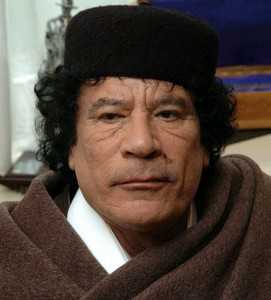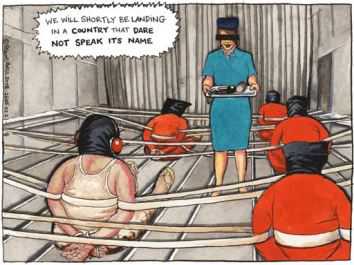by Bill Van Auken
 US embassy cables released by WikiLeaks on Wednesday and Thursday expose the close collaboration between the US government, top American politicians and Muammar Gaddafi, who Washington now insists must be hunted down and murdered.
US embassy cables released by WikiLeaks on Wednesday and Thursday expose the close collaboration between the US government, top American politicians and Muammar Gaddafi, who Washington now insists must be hunted down and murdered.
Washington and its NATO allies are now determined to smash the Libyan regime, supposedly in the interests of “liberating” the Libyan people. That Gaddafi was until the beginning of this year viewed as a strategic, if somewhat unreliable, ally is clearly seen as an inconvenient truth.
The cables have been virtually blacked out by the corporate media, which has functioned as an embedded asset of NATO and the so-called rebel forces that it directs. It is hardly coincidental that the WikiLeaks posting of the cables was followed the next day by a combination of a massive denial of service attack and a US judge’s use of the Patriot Act to issue a sweeping “production order” or subpoena against the anti-secrecy organization’s California-based Domain Name Server, Dynadot.
The most damning of these cables memorializes an August 2009 meeting between Libyan leader Muammar Gaddafi and his son and national security adviser, Muatassim, with US Republican Senators John McCain (Arizona), Lindsey Graham (South Carolina), Susan Collins (Maine) and Connecticut “independent” Joe Lieberman.
McCain, the Republican presidential candidate in 2008, has in recent speeches denounced Gaddafi as “one of the most bloodthirsty dictators on Earth” and criticized the Obama administration for failing “to employ the full weight of our airpower” in effecting regime change in Libya.
In the meeting held just two years ago, however, McCain took the lead in currying favor with the Gaddafis. According to the embassy cable, he “assured” them that “the United States wanted to provide Libya with the equipment it needs for its security” and “pledged to see what he could do to move things forward in Congress.”
The cable continues to relate McCain’s remarks: “He encouraged Muatassim to keep in mind the long-term perspective of bilateral security engagement and to remember that small obstacles will emerge from time to time that can be overcome. He described the bilateral military relationship as strong and pointed to Libyan officer training at U.S. Command, Staff, and War colleges as some of the best programs for Libyan military participation.”
The cable quote Lieberman as saying, “We never would have guessed ten years ago that we would be sitting in Tripoli, being welcomed by a son of Muammar al-Qadhafi.” It states that the Connecticut senator went on to describe Libya as “an important ally in the war on terrorism, noting that common enemies sometimes make better friends.”
The “common enemies” referred to by Lieberman were precisely the Islamist forces concentrated in eastern Libya that the US then backed Gaddafi in repressing, but has now organized, armed and led in the operation to overthrow him.
The US embassy summarized: “McCain’s meetings with Muammar and Muatassim al-Qadhafi were positive, highlighting the progress that has been made in the bilateral relationship. The meetings also reiterated Libya’s desire for enhanced security cooperation, increased assistance in the procurement of defense equipment, and resolution to the C130s issue” (a contract that went unfulfilled because of previous sanctions).
Another cable issued on the same meeting deals with McCain’s advice to the Gaddafis about the upcoming release from a Scottish prison of Abdelbaset al-Megrahi, who had been convicted for the 1988 bombing of Pan Am 103 over Lockerbie, Scotland. McCain, who now fulminates about Gaddafi having “American blood on his hands,” counseled the Libyan leader that the release was a “very sensitive issue” in the US and that he should handle it discreetly, “in a way that would strengthen the growing relationship between our two countries, rather than hinder its progress.” Ultimately Gaddafi and other leading Libyan officials gave a hero’s welcome to Megrahi, who has proclaimed his innocence and had been set to have his appeal heard when the Scottish government released him.
Other cables highlight the increasingly close US-Libyan military and security cooperation. One, sent in February 2009, provides a “security environment profile” for Libya. It notes that US personnel were “scheduled to provide 5 training courses to host government law enforcement and security” the next month. In answer to whether the Libyan government had been able to “score any major anti-terrorism successes,” the embassy praised the Gaddafi regime for having “dismantled a network in eastern Libya that was sending volunteer fighters to Algeria and Iraq and was plotting attacks against Libyan security targets using stockpiled explosives. The operation resulted in the arrest of over 100 individuals.” Elements of this same “network” make up an important component of the “rebels” now armed and led by NATO.
Asked by the State Department if there existed any “indigenous anti-American terrorist groups” in the country, the embassy replied “yes”, pointing to the Libyan Islamic Fighting Group (LIFG), which it noted had recently announced its merger with Al Qaeda in the Lands of the Islamic Maghreb (AQIM). Again, elements of the LIFG are active in the leadership of the so-called rebels.
An April 2009 cable preparing Muatassim Gaddafi’s trip to Washington that month stresses plans for anti-terrorist training for Libyan military officers and potential arms deals. In its conclusion the embassy states: “The visit offers an opportunity to meet a power player and potential future leader of Libya. We should also view the visit as an opportunity to draw out Muatassim on how the Libyans view ‘normalized relations’ with the U.S. and, in turn, to convey how we view the future of the relationship as well. Given his role overseeing Libya’s national security apparatus, we also want his support on key security and military engagement that serves our interests.”
A May 2009 cable details a cordial hour-long meeting between Gaddafi and the then-head of the US Africa Command, General William Ward.
An August 2008 cable, a “scene setter” for the “historic visit” of Secretary of State Condoleezza Rice to Tripoli, declares that “Libya has been a strong partner in the war against terrorism and cooperation in liaison channels is excellent … Counter-terrorism cooperation is a key pillar of the U.S.-Libya bilateral relationship and a shared strategic interest.”
Many of the cables deal with opportunities for US energy and construction firms to reap “bonanzas” in the North African country and note with approval privatization efforts and the setting up of a Tripoli stock exchange.
Others, however, express concern, not about the Gaddafi regime’s repressive measures, but rather foreign policy and oil policy moves that could prejudice US interests. Thus, an October 2008 cable, cynically headlined “AL-QADHAFI: TO RUSSIA, WITH LOVE?” expresses US concern about the Gaddafi regime’s approach to Russia for lucrative arms purchases and a visit to Tripoli harbor by a flotilla of Russian warships. One month later, during a visit to Moscow, Gaddafi discussed with the Putin regime the prospect of the Russian navy establishing a Mediterranean port in the city of Benghazi, setting off alarm bells at the Pentagon.
Cables from 2008 and 2009 raise concerns about US corporations not getting in on “billions of dollars in opportunities” for infrastructure contracts and fears that the Gaddafi regime could make good on the Libyan leader’s threat to nationalize the oil sector or utilize the threat to extract more favorable contracts from the foreign energy corporations.
The cables underscore the hypocrisy of the US and its allies in Britain, France and Italy, who have championed “regime change” in the name of protecting Libyan civilians and promoting “democracy.”
Those like Obama, Sarkozy, Cameron and Berlusconi who have branded Gaddafi a criminal to be hunted down and murdered were all his accomplices. All of them collaborated with, armed and supported the Gaddafi regime, as US and European corporations reaped vast profits from Libya’s oil wealth.
In the end, they seized upon the upheavals in the region and the anti-Gaddafi protests in Libya as the opportunity to launch a war to establish outright semi-colonial control over the energy-rich country and rid themselves of an ally who was never seen as fully reliable or predictable and upset his patrons with demands for better deals with big oil, closer ties with Russia and China and the threat of replacing the euro and dollar with a “gold dinar.”
Bill Van Auken is a frequent contributor to Global Research.
www.globalresearch.ca, 27 August 2011
 We are aware that your service has been cooperating with the British to effect Abu Munthir’s removal to Tripoli’
We are aware that your service has been cooperating with the British to effect Abu Munthir’s removal to Tripoli’




